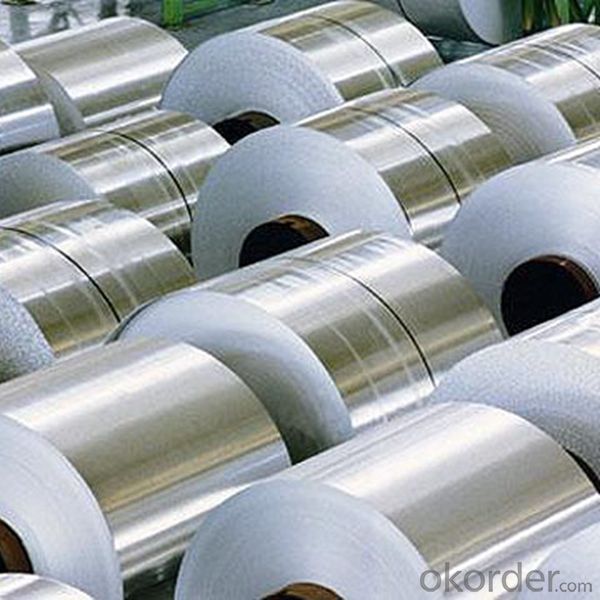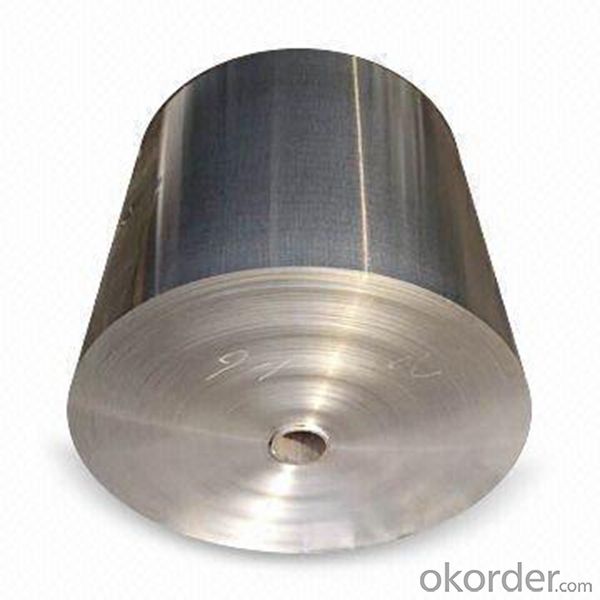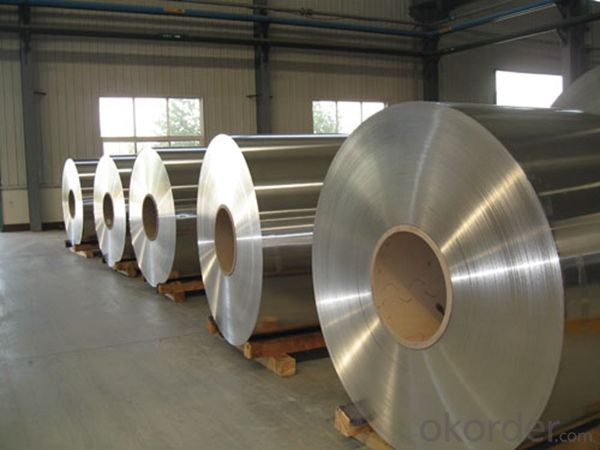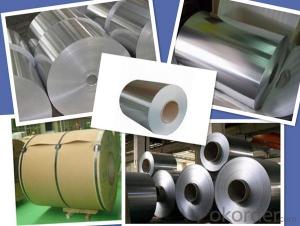Mill Finished Aluminum Rolls 2024 for Automotive Spare Parts
- Loading Port:
- Shanghai
- Payment Terms:
- TT OR LC
- Min Order Qty:
- 5 m.t.
- Supply Capability:
- 10000 m.t./month
OKorder Service Pledge
OKorder Financial Service
You Might Also Like
Item specifice
1. Specification of Mill Finished Aluminum Rolls 2024 for Automotive Spare Parts
characteristics | Application |
1) Super peeling strength | 1) Building exterior curtain walls |
2) Excellent surface flatness and smoothness | 2) Decoration and renovation additions for old buildings |
3) Superior weather, corrosion, pollutant resistance | 3) Decoration of interior walls, ceilings, bathrooms, kitchens and balconies |
4) Even coating, various colors | 4) Shop door decorations |
5) Fireproof, excellent heat and sound insulation | 5) Advertisement board display platforms and signboards |
6) Superior impact resistance | 6) Wallboards and ceilings for tunnels |
7) Lightweight and easy to process | 7) Industrial materials, materials for vehicles and boats |
2. Application of Mill Finished Aluminum Rolls 2024 for Automotive Spare Parts
(1).Interior: wall cladding, ceilings, bathrooms, kitchens and balconies, shutters, doors...
(2).Exterior: wall cladding, facades, roofing, canopies, tunnels,column covers , renovations...
(3).Advertisement: display platforms, signboards, fascia, shop fronts...
3. Feature of Mill Finished Aluminum Rolls 2024 for Automotive Spare Parts
*Such coil is specially designed to replace aluminum ingot, due to the high export tax of aluminum ingot, the coil has better price than ingot.
*This type of coil can fit customer's remelting furnace just like ingot, no need to make any change to the production line that was previously used for ingot. The standard coil size and weight is very suitable for the feed gate of furnace.
*This type of coil causes less material wastage than ingot when remelted.
*Our coil is made directly from ore, no need to go though the ingot making process, quality is much better than other suppliers who use ingot scrap to make coil.
Be free from Oil Stain, Dent, Inclusion, Scratches, Stain, Oxide Dicoloration, Breaks, Corrosion, Roll Marks, Dirt Streaks and other defect which will interfere with use
4. Certificate:
SGS and ROHS(if client request, paid by client), MTC(plant provided), Certificate of Origin(FORM A, FORM E, CO), Bureau Veritas and SGS (if client request, paid by client), CIQS certificate
5. Image of Mill Finished Aluminum Rolls 2024 for Automotive Spare Parts



6. Package and shipping of Mill Finished Aluminum Rolls 2024 for Automotive Spare Parts
eye to wall
eye to the wall
with wood pallet (wooded case also available)
7. FAQ
1) What is the delivery time?
Dpends on actual order, around 20 to 35 days
2)What is the QC system:
We have QC staff of 20 persons and advanced equipment, each production is with MTC traced from Aluminum ingot lot.
3) What market do you mainly sell to?
Australia, America, Asia, Middle East, Western Europe, Africa etc
- Q:What are the regulations and standards governing the production of aluminum coils?
- The production of aluminum coils is governed by a variety of regulations and standards to ensure product quality, safety, and environmental sustainability. These regulations may vary depending on the country or region, but there are some common industry standards that are widely recognized. One of the primary regulations governing the production of aluminum coils is related to product quality and specifications. Aluminum coils must meet specific standards set by organizations such as the American Society for Testing and Materials (ASTM) or the International Organization for Standardization (ISO). These standards define the physical and chemical properties that the aluminum coils must possess, such as thickness, width, tensile strength, and chemical composition. In terms of safety, there are regulations in place to protect workers and facilities involved in the production process. Occupational Safety and Health Administration (OSHA) regulations, for example, outline safety measures and requirements to prevent accidents and ensure safe working conditions. This may include guidelines for handling and storing aluminum coils, personal protective equipment requirements, and emergency response protocols. Additionally, environmental regulations play a crucial role in the production of aluminum coils. These regulations aim to minimize the impact of the production process on the environment and ensure sustainable practices. For instance, there may be regulations regarding the treatment and disposal of waste materials, the use of energy-efficient equipment, and the reduction of greenhouse gas emissions. Furthermore, industry-specific organizations such as the Aluminum Association in the United States or the European Aluminium Association in Europe also establish voluntary standards and best practices for the production of aluminum coils. These organizations work closely with manufacturers to develop guidelines for quality control, sustainability, and continuous improvement in the industry. Overall, the production of aluminum coils is governed by a combination of regulations and standards that encompass product quality, safety, and environmental considerations. Compliance with these regulations ensures the production of high-quality aluminum coils that meet customer requirements and contribute to a sustainable and responsible industry.
- Q:What are the safety precautions required when handling aluminum coils?
- To ensure the safety of individuals and minimize the risk of accidents, it is important to adhere to certain safety precautions when dealing with aluminum coils. 1. Wearing the appropriate Personal Protective Equipment (PPE) is essential. This includes safety glasses or goggles, gloves, and steel-toed boots. These protective items safeguard against injuries caused by sharp edges or flying metal particles. 2. To avoid strains or back injuries, it is important to employ proper lifting techniques when handling heavy aluminum coils. Lift with your legs, not your back, and utilize lifting aids or equipment when necessary. 3. Proper storage and handling of aluminum coils are crucial. Store them in a well-ventilated area that is free from excessive heat or moisture. It is imperative to stack them securely to prevent injury from falling or rolling coils. 4. Fire prevention measures are vital due to the high flammability of aluminum in the form of fine powder or shavings. Keep the working area clean and free from combustible materials. Smoking or open flames should be strictly prohibited in the vicinity. 5. Be cautious of sharp edges on aluminum coils, as they can cause cuts or lacerations. Handle the coils with care and use appropriate tools or equipment when cutting or shaping them to minimize the risk of injury. 6. Provide proper training and education to all individuals involved in handling aluminum coils. This includes understanding the properties of the material, safe handling techniques, and emergency procedures in case of accidents or spills. 7. Be aware of potential chemical hazards associated with coatings or treatments on aluminum coils. Follow the appropriate safety procedures when handling or working with them. By adhering to these safety precautions, the risk of accidents, injuries, and potential hazards can be significantly reduced when handling aluminum coils. Prioritizing safety and ensuring that all employees are trained and equipped with the necessary knowledge and protective gear is crucial.
- Q:Can aluminum coils be used in kitchen appliances?
- Kitchen appliances can indeed utilize aluminum coils. Due to its remarkable thermal conductivity and resistance to corrosion, aluminum is extensively employed in the production of kitchen appliances. It finds frequent application in refrigerators, air conditioners, and other devices that necessitate efficient heat transfer. Lightweight and enduring, aluminum coils effectively disperse heat, rendering them ideal for a wide array of kitchen appliances.
- Q:What is the tensile strength of an average aluminum coil?
- The specific alloy and temper of aluminum can cause variations in the tensile strength of an average aluminum coil. On average, aluminum coils possess a tensile strength between 13,000 and 30,000 pounds per square inch (psi). It is worth noting that this range is an approximate estimation and the actual tensile strength can be affected by factors like the manufacturing process, alloy composition, and any heat treatments administered to the aluminum.
- Q:How are aluminum coils packaged for transportation?
- Aluminum coils are typically packaged for transportation by first being tightly wound and then securely strapped with steel bands. They are often placed on pallets and covered with protective materials such as plastic or cardboard to prevent damage during transit. Additionally, the coils may be loaded into containers or onto flatbed trucks, ensuring proper handling and stability throughout the transportation process.
- Q:What are the uses of aluminum coils?
- Aluminum coils have a wide array of applications in various industries. HVAC systems and air conditioning units heavily rely on aluminum coils for their heat transfer and air cooling functions. These coils are indispensable components in these systems. Moreover, the construction industry frequently utilizes aluminum coils for roofing, cladding, and insulation purposes. Their lightweight nature, durability, and resistance to corrosion make them perfect for outdoor applications. The automotive industry also incorporates aluminum coils in the production of vehicles. These coils are used in the manufacturing of various parts, including radiators, heat exchangers, and condensers, owing to their exceptional heat transfer properties. The packaging industry extensively depends on aluminum coils as well. These coils are employed in the production of cans and containers for food and beverages. Aluminum is an excellent choice for packaging due to its lightweight nature, recyclability, and ability to provide a barrier against moisture, oxygen, and light. This ensures the quality and freshness of the enclosed products. Furthermore, aluminum coils find applications in electrical wiring, where they serve as conductors due to their high electrical conductivity. They are also used in the production of electronics like laptops, smartphones, and tablets, as they possess excellent heat dissipation properties. In conclusion, the uses of aluminum coils span across a diverse range of industries, including HVAC systems, construction, automotive, packaging, and electrical applications. The versatility, durability, and exceptional properties of aluminum make it a favored material choice in numerous sectors.
- Q:How are aluminum coils used in the production of aircraft components?
- Aluminum coils play a crucial role in the production of aircraft components. These coils are typically made from high-quality aluminum alloys that offer a combination of strength, durability, and lightness, making them ideal for aircraft manufacturing. One primary use of aluminum coils in aircraft production is in the fabrication of sheet metal parts. These coils are processed through various techniques such as rolling, stretching, and bending to form flat sheets of aluminum. These sheets are then cut and shaped to create various aircraft components, including wings, fuselage panels, and tail surfaces. The lightweight nature of aluminum makes it a preferred material for aircraft construction as it helps reduce the overall weight of the aircraft, enhancing fuel efficiency and performance. By using aluminum coils, manufacturers can easily produce thin and lightweight parts, which contribute to the aircraft's overall weight reduction. Moreover, aluminum coils are also used in the production of structural components such as frames and beams. These coils are formed into extrusions, which are then cut and joined to create structural elements of the aircraft. Aluminum's high strength-to-weight ratio makes it an excellent choice for these components, as it provides the required strength while keeping the weight of the aircraft low. In addition to its structural applications, aluminum coils are also used in the production of various aircraft systems. For instance, these coils are utilized in the construction of heat exchangers, air conditioning units, and fuel tanks. The excellent thermal conductivity of aluminum allows for efficient heat transfer, which is crucial for maintaining optimal operating conditions within the aircraft. Overall, aluminum coils are extensively used in the production of aircraft components due to their lightweight, high strength, and excellent thermal properties. Their versatility and ability to be processed into various shapes and sizes make them a preferred material for manufacturing crucial aircraft parts, ensuring the safety, performance, and efficiency of modern aircraft.
- Q:Are there any limitations on the width-to-thickness ratio of aluminum coils?
- Yes, there are limitations on the width-to-thickness ratio of aluminum coils. The specific limitations depend on various factors such as the intended application, manufacturing process, and the mechanical properties of the aluminum alloy being used. Generally, a higher width-to-thickness ratio can result in increased material instability, difficulty in handling, and potential quality issues. Therefore, it is necessary to carefully consider these factors and consult industry standards and guidelines to determine the appropriate width-to-thickness ratio for aluminum coils.
- Q:I take an extracurricular aircraft class, and I got the okay to take some old painted sheet aluminum for another project I'm working on. The problem is, what I'm using it for I need bare aluminum. I heard around that air crafts are painted with something that regular (store-bought) paint stripper can't remove. Is this true? I am aware of the fact that stripping something like that will result in a toxic paint sludge, so I've taken precautions for that. I just need to know if heavy-duty paint stripper from Home Depot will do the job. Thanks :)
- By the time you get done screwing around with different kinds of strippers, it would probably be cheaper to buy a sheet of aluminum. The USAF uses a baking soda blaster to strip paint during depot level maintenance.
- Q:... of aluminum atoms?(mole = 6.022x10^23)
- Wonderful first answer, but I am going to try anyways. For 1 mole, you need 27 grams of aluminum. The density of aluminum is 2700 kg/m^3, which means that 2.7 grams is contained in 1 cm^3 We know, Volume = Length * Breadth * Thickness 10 = L * (30.48) * Thickness So, just convert the thickness that you have into cm, and then use it in the above equation. --edited from here-- The atomic radius is 125 pM So, you have each atom having 250 pM Total thickness = 250 * 10^-12 * 92000 m = 0.0023 cm Use this in the equation : 10 = L * 30.48 * 0.0023 L = 142 cm
1. Manufacturer Overview |
|
|---|---|
| Location | |
| Year Established | |
| Annual Output Value | |
| Main Markets | |
| Company Certifications | |
2. Manufacturer Certificates |
|
|---|---|
| a) Certification Name | |
| Range | |
| Reference | |
| Validity Period | |
3. Manufacturer Capability |
|
|---|---|
| a)Trade Capacity | |
| Nearest Port | |
| Export Percentage | |
| No.of Employees in Trade Department | |
| Language Spoken: | |
| b)Factory Information | |
| Factory Size: | |
| No. of Production Lines | |
| Contract Manufacturing | |
| Product Price Range | |
Send your message to us
Mill Finished Aluminum Rolls 2024 for Automotive Spare Parts
- Loading Port:
- Shanghai
- Payment Terms:
- TT OR LC
- Min Order Qty:
- 5 m.t.
- Supply Capability:
- 10000 m.t./month
OKorder Service Pledge
OKorder Financial Service
Similar products
New products
Hot products
Hot Searches
Related keywords





























